"We are learning from a nation that succeeds in controlling the COVID-19 and they are very generously passing on the knowledge, which will certainly allow us to save many lives."
by Xinhua writers Cui Yuanlei, Shooka Shemirani, Yang Chunxue
MEXICO CITY, March 27 (Xinhua) -- As the novel coronavirus is spreading across the world, Latin America, which is home to about 650 million people and where the infection cases are climbing, is doubling down on efforts to confront the COVID-19 pandemic.
Hardest-hit countries, including Brazil, Ecuador and Chile, have imposed blanket quarantine measures and night curfews, and shut down most businesses as the region's confirmed cases have exceeded 10,000 with over 160 fatalities, according to the latest figures from the Johns Hopkins University.
Fortunately, Latin America does not fight alone, with China extending a helping hand. A three-hour video conference was held earlier this week between doctors of China and Latin American and Caribbean countries, with Chinese experts briefing their Latin American counterparts on the virus's characteristics and China's experience in disease control and clinical treatment.
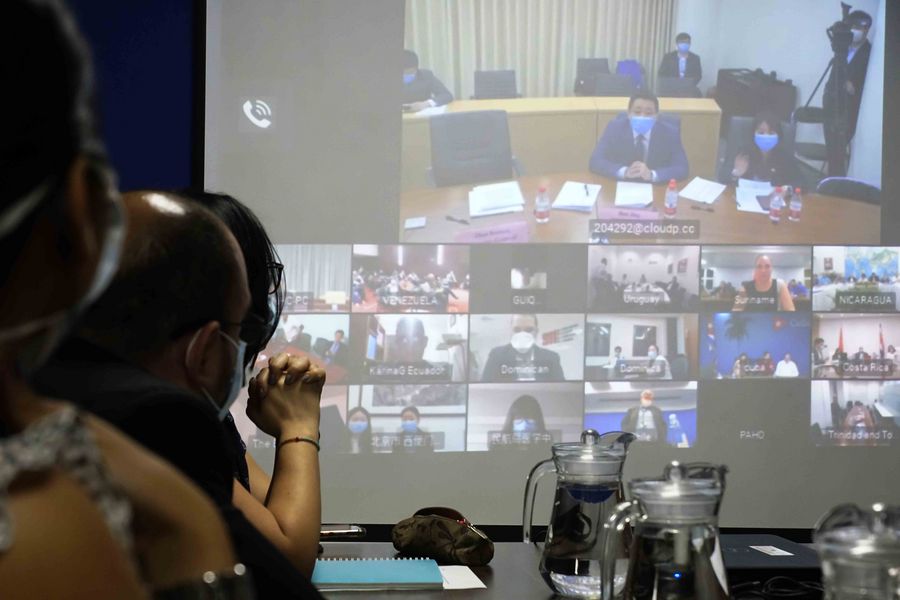
Photo taken on March 23, 2020 shows the venue of an online meeting on COVID-19 epidemic prevention and control among representatives from China and Latin American and Caribbean countries in San Salvador, El Salvador. (Photo by Alexander Pena/Xinhua)
LIFE UNDER LOCKDOWN
Brazilian lawyer Rachel Perrut has mostly hunkered down at home since residents of Rio de Janeiro were told to stay indoors and work remotely to avoid contracting COVID-19.
"We have never before been isolated from the rest of the world, from parks, family and friends ... We only leave the house when we really need to, like to buy food and medicine," Perrut, a mother of two, told Xinhua.
Throughout Latin America, authorities are urging people to practice social distancing to slow the rate of infection, so that local hospitals can better meet soaring demand.
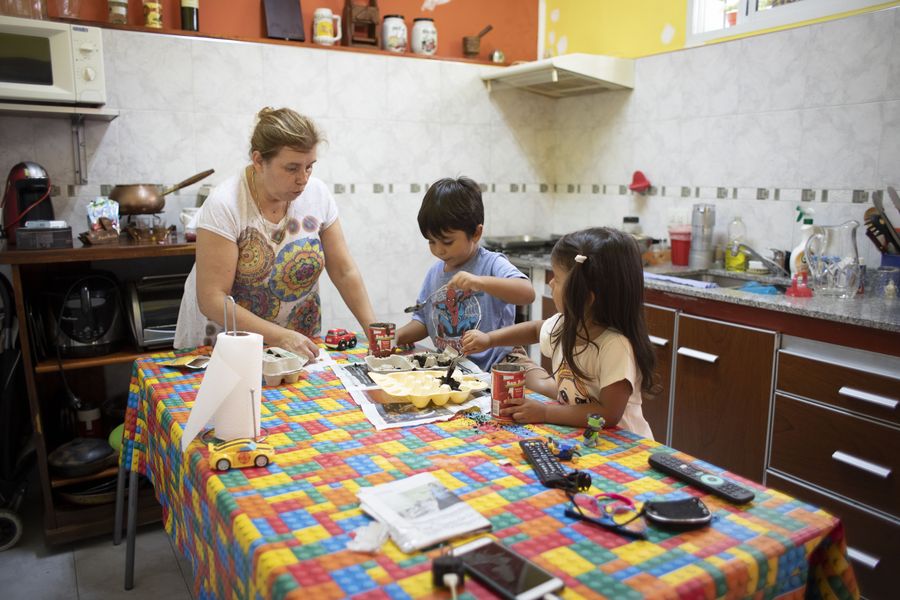
Two children stay at home after their school was closed in Argentina, March 16, 2020. (Xinhua/Martin Zabala)
In Chile's capital Santiago, subway ridership fell by 67 percent after President Sebastian Pinera declared a state of catastrophe on March 19.
Capital and major cities in the region have canceled concerts and sports events. Restaurants and bars are empty. Schools have been closed for at least two weeks so children are staying at home, posing a challenge to working parents like Perrut.
"Imagine working with two small children in the house! It is possible, but it is very difficult," said Perrut. "We make our day-to-day routine based on planning, planning the daily activities of the children so they don't spend all day on the phone, watching TV or playing video games."
In addition, Chile and some other South American countries have closed their borders and banned incoming flights, especially those from places with raging outbreaks.
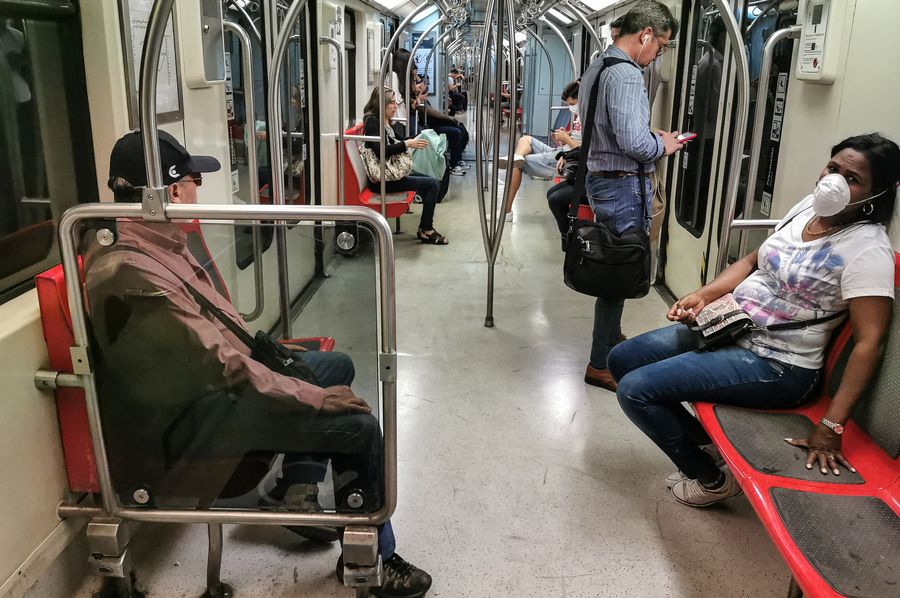
Passengers wearing face masks are seen in a subway train carriage in Santiago, Chile, March 17, 2020. (Photo by Jorge Villegas/Xinhua)
PRACTICAL MEASURES
Latin America has spared no effort to rapidly brace itself for the health emergency, taking practical and effective measures to fight or mitigate the impact of the virus.
Introducing high-tech to confront the coronavirus, Mexico established a network of Chinese-made thermographic cameras to screen for fevers, one of the main symptoms of infection. The AI-enabled cameras, which use infrared sensors to measure body temperature from a distance, are installed outside business and financial centers in the country's capital and other major cities like Monterrey and Guadalajara.
To compensate for a lack of schooling, the Argentine government has launched a program called "We continue to educate" to provide households with educational contents online, as well as on public TV and radio networks.
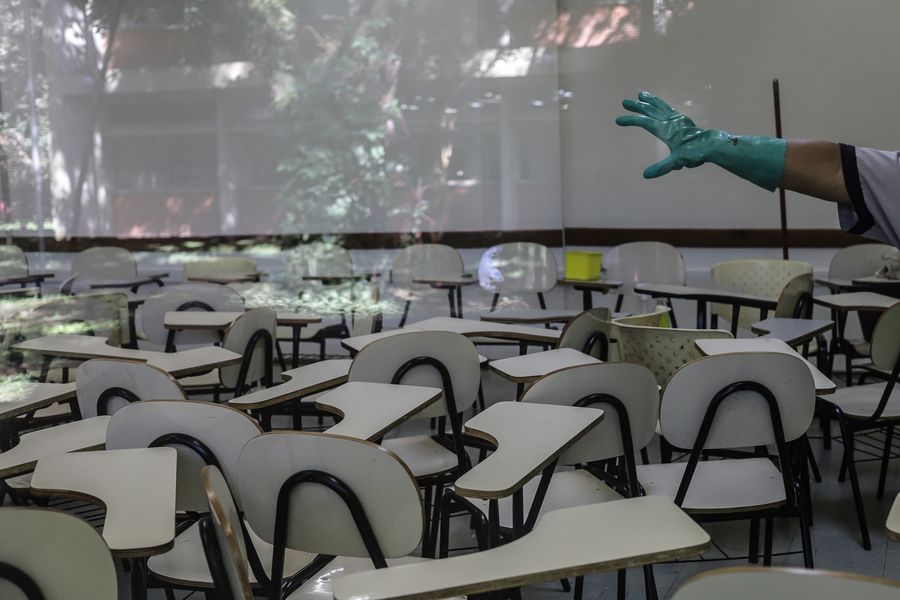
A worker cleans a classroom in Universidade de Sao Paulo (USP) that has suspended class due to the COVID-19 outbreak in Sao Paulo, Brazil, March 17, 2020. (Photo by Rahel Patrasso/Xinhua)
"Using the website, people are going to have all of the educational tools to continue to teach and learn," Education Minister Nicolas Trotta has said.
Colombia's educational sector is following suit, said Luis Alfredo Tellez, head of the Department of Communications at the University of San Buenaventura in Bogota.
Although the university already had some online educational material before, it was not enough, Tellez said, noting that the current crisis offers a good opportunity for the university to upgrade its online courses.
"This situation has made us see a reality we had overlooked, and it will serve as a departure point to make the most of all the technology (available) to reinforce many educational programs in the future," he said.
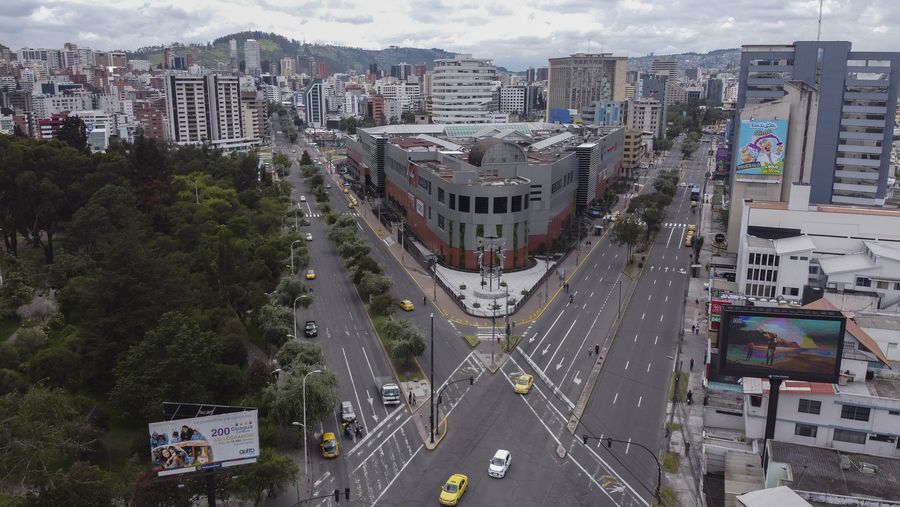
Photo taken on March 15, 2020 shows a few cars running on streets in Quito, Ecuador. (Photo by Santiago Armas/Xinhua)
VALUABLE EXPERIENCE
Colombia's medical and scientific community has called on the government to learn from China's experience in tackling the pandemic, which, according to the latest data from Johns Hopkins University's Center for Systems Science and Engineering (CSSE), has infected more than 600,000 people worldwide and claimed nearly 28,000 lives as of 05:00 Eastern Time (0900 GMT) Saturday.
Once the Chinese authorities realized that they were facing a novel coronavirus outbreak in the central city of Wuhan, they acted swiftly and decisively to contain its spreading.
China demonstrated its capacity to build hospitals in 10 days and its determination to save the lives of all COVID-19 patients, Catalina Bedoya, an epidemiologist at the Mederi University Hospital in Bogota, told Xinhua.
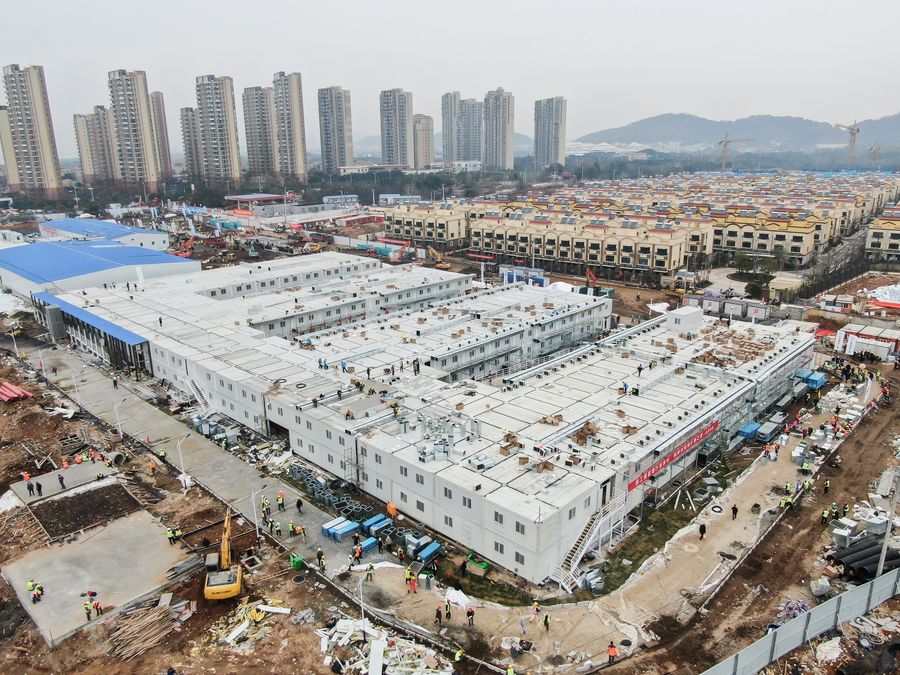
Aerial photo taken on Feb. 2, 2020 shows the Huoshenshan (Fire God Mountain) Hospital in Wuhan, central China's Hubei Province. China has built a makeshift hospital in 10 days to battle against the novel coronavirus in Wuhan. (Xinhua/Cheng Min)
"We must take their capacity to take action and definitively protect healthcare workers as a model and not take an eternity for each construction project," Bedoya said.
China's strict quarantine and containment measures, in particular, should be adopted in Latin America before the pandemic snowballs, said infectious disease expert Fernando Ferry of the Gaffree e Guinle University Hospital in Rio de Janeiro, stressing the importance of prevention.
COVID-19 "is a disease with a high rate of transmission ... so we either follow the Chinese model of containment or it will lead to many more victims," said Ferry.

Customers do shopping at a supermarket in Bogota, capital of Colombia, March 13, 2020. (Photo by Jhon Paz/Xinhua)
JOINT PREVENTION AND CONTROL
Given the virulent nature of the virus and the fact that no country has dealt with it before and can beat it alone, China's sharing of its findings has been crucial, regional observers said.
During Monday's video conference on COVID-19 prevention and control, Chinese experts talked in detail about the trajectory and features of the outbreak and China's experience in disease control, clinical treatment, customs administration and community-based quarantine, and gave thorough answers to their foreign counterparts' questions.
After the video conference, Latin American decision-makers have a much clearer idea of what needs to be done to bring the epidemic under control, said Paula Daza, Chilean deputy minister of public health.
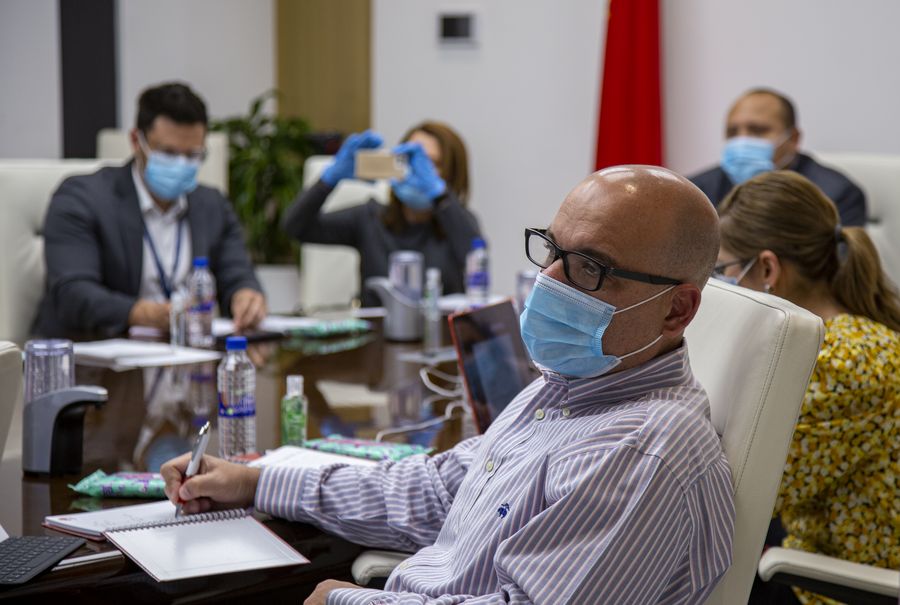
Photo taken on March 23, 2020 shows the venue of an online meeting on COVID-19 epidemic prevention and control among representatives from China and Latin American and Caribbean countries in San Jose, Costa Rica. (Photo by Dato/Xinhua)
"The importance of making a quick and timely diagnosis of those who have had direct contact (with an infected patient) is notable, and it is one of our challenges here in Chile," said Daza.
Venezuelan Deputy Minister of Health Odilia Gomez said the video conference was of "utmost importance, because it allows us to immediately have access to key information about the large-scale management (of a health crisis) in a city of more than 10 million residents."
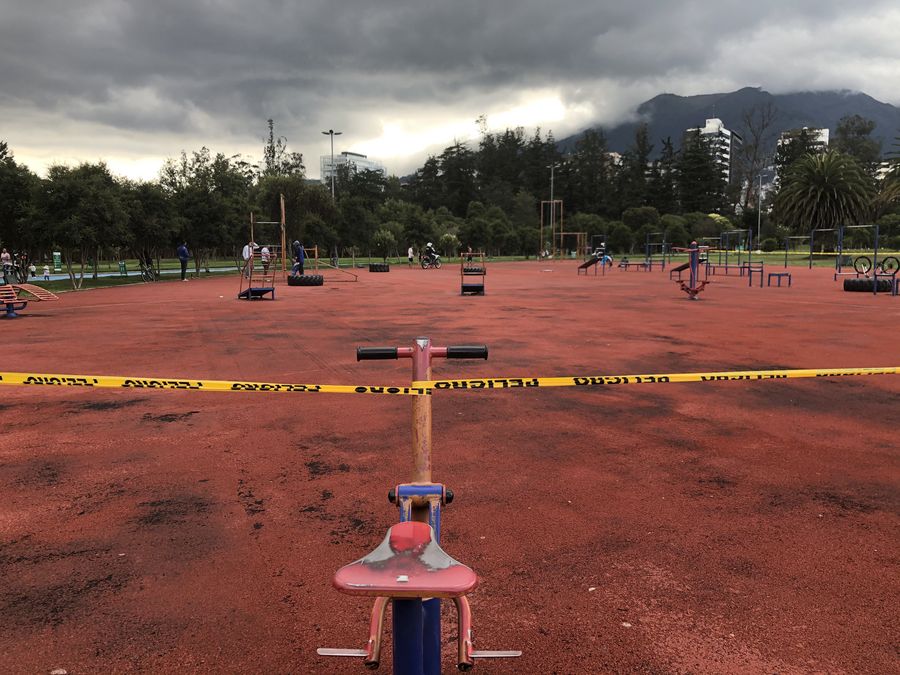
Exercise equipments for public use are cordoned off at a park in Quito, Ecuador, March 15, 2020. (Photo by Santiago Armas/Xinhua)
The exchange between Latin American and Chinese experts was invaluable, said Mario Ruiz, medical manager of the Costa Rican Social Security Institute. "We are learning from a nation that succeeds in controlling the COVID-19 and they are very generously passing on the knowledge, which will certainly allow us to save many lives."
Costa Rica, with a total caseload of 263 as of Friday, is making hospital beds available for potential COVID-19 patients by postponing elective surgical procedures.
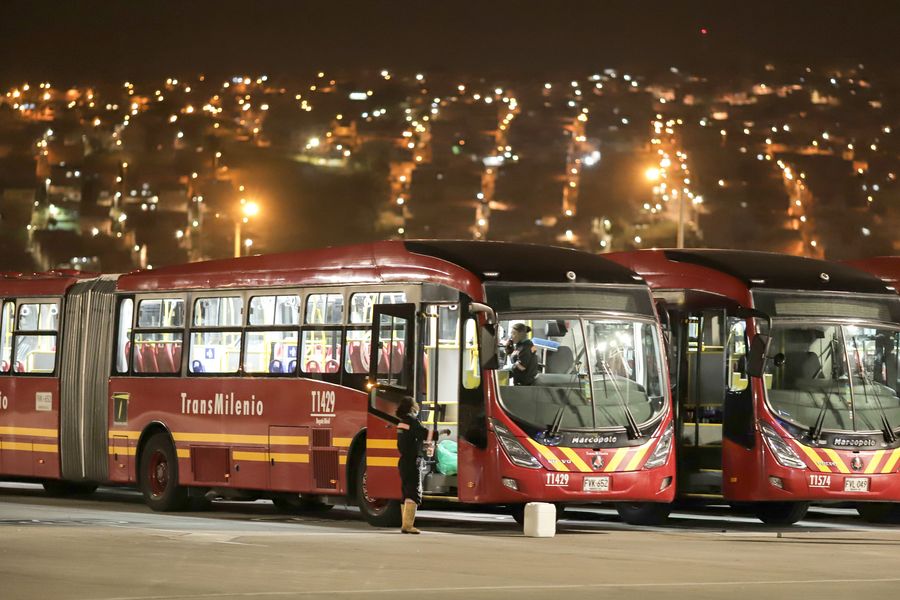
Employees clean a bus in Bogota, capital of Colombia, March 11, 2020. (Photo by Jhon Paz/Xinhua)
"We are preparing for the worst, but hoping for the best, and with this type of multilateral help, I am sure that things will turn out well," Ruiz said.
(Xinhua reporters Wu Hao, Yan Liang in Mexico City, Chen Weihua, Zhao Yan in Rio de Janeiro, Yin Nan, Zhang Xiaoran in Santiago, Ni Ruijie in Buenos Aires, Gao Chunyu in Bogota, Xu Ye in Caracas, Fan Xiaolin in San Jose also contributed to the story.)
(Video reporters: Cui Yuanlei, Yu Lizhen; Video editor: Wei Yin)■



